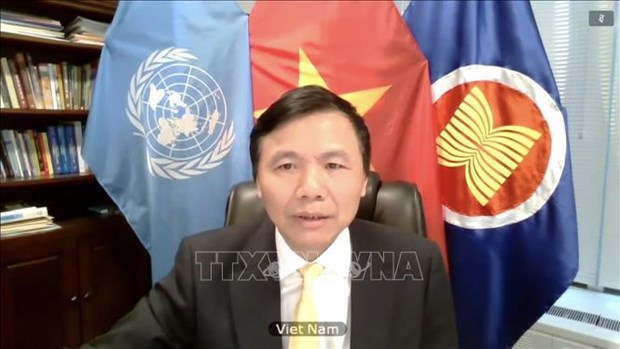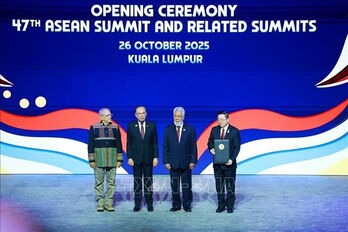
Ambassador Dang Dinh Quy (Photo: VNA)
The meeting, jointly held by UNSC members - Estonia, Norway, France, Tunisia, Ireland, the UK, the US, Kenya, Niger, Saint Vincent and the Grenadines, and Vietnam - along with Belgium, Sweden, Germany and Canada, drew representatives from 32 countries, a number of UN agencies and non-governmental organisations.
According to Virginia Gamba, Special Representative of the Secretary-General for Children and Armed Conflict, the COVID-19 pandemic has caused the delay of activities supporting children in armed conflicts, while posing adverse impacts on the UN's capacity in supervising and verifying serious violations against children and preventing the UN's efforts at national level in contacting parties involving in conflicts to end and avoid violations against children.
She cited the UN's statistics showing children who become victims of recruitment and use by armed forces and groups can indeed be forced not only to engage in combat but also to work as lookouts, porters, cooks or used for sexual purposes.
Participants at the meeting highlighted challenges related to the protection of children amid armed conflicts, holding that the pandemic is causing more difficulties in the activity.
They sought solutions to the problems, including governments’ responsibilities in protecting and ensuring the rights of children as well as international cooperation, especially in finance in the work at national and regional levels.
Addressing the meeting, Quy expressed his deep concern about the losses and disadvantages facing children amid armed conflicts, asserting that COVID-19 is worsening the situation and causing more difficulties for the supervision and reporting of the UN in the field.
He stressed the need for countries in armed conflicts to bear primary responsibility in meeting fundamental demands of children and abide by regulations in international humanity and human rights.
The ambassador held that in order to settle the root of conflicts, it is necessary to ensure children’s education access and enhance the empowerment of children, which will help them nurture and develop the peace culture.
Meanwhile, parties joining the armed conflicts must immediately stop and prevent all attacks targeting schools, he stated, underscoring the significance of strengthening international cooperation in increasing the efficiency of supervision over measures to protect children amid armed conflicts./.
VNA
 Timor-Leste seeks trade & investment expansion following ASEAN accession
Timor-Leste seeks trade & investment expansion following ASEAN accession



